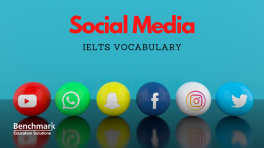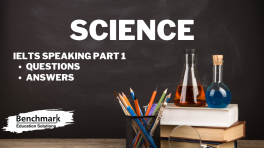

This page contains some of the most common science and technology-related questions on the IELTS exam, along with some sample answers and exercises for you to practice using the most essential and frequently used vocabulary. Science and technology topics can incorporate a wide range of our everyday activities and thoughts. Using specific IELTS vocabulary related to the individual scientific field will help you form relevant and coherent answers with a high degree of accuracy.
Table of Contents
1. Computer, IT & Internet Vocabulary
Computer, IT, and internet vocabulary –
The internet and computers are a part of most people’s lives so it is vital that you know and can use the vocabulary correctly. The following are some of the most common words on the IELTS examination related to computers and the internet, followed by an exercise for you to practice using the words.
- AI (artificial intelligence) – Computer systems that can perform tasks without human assistance
- Boot-up / Start-up – To start a computer
- Computer literacy – The ability to use a computer and its functions
- Cyber-crime – Crime committed over the internet such as fraud and identity theft.
- Personal data – The information held by websites/companies on internet users and customers
- Database – A structured set of data held in a computer
- Device/gadget – A small mechanical/electrical tool such as a phone
- Hacker – A person who accesses data illegally
- Hardware – Tools, physical devices, and machinery such as computers and monitors
- Internetsecurity – Security processes aimed at deterring crime and exploitation
- Laptop – A portable personal computer
- Online – Connected to the internet
- PC (personalcomputer) – A computer used mainly by people at home, such as a desktop PC
- Privacy – A person’s right to keep their data private
- Reboot – To restart a computer
- Socialmedia – Websites designed for people to socialise and interact
- Software – Computer programs and games
- Technophobe – A person who is not very good at using technology
- Tech-savvy – A person who is good at using technology
- Tobrowse – Scan through a text or website
- Tocrash – When the operating system or program stops functioning correctly
- Tosurftheinternet – To navigate different websites on the internet
- Viral – To become extremely popular online
- Virus – Malicious software designed to cause damage to computer systems
- Website – A set of pages on the internet typically produced by an organization or person
- Wi-Fi – A system that allows connection to the internet without cables
2. Activity 1 – IT Vocabulary Exercise
| Activity 1 |
- laptop
- database
- pc
- surf
- websites
- social media
- personal data
- viral
- software
- cyber-crime
- virus
- crash
3. General Science & Technology Vocabulary
The following are words used to describe processes and developments in science and technology. At the end of the vocabulary list, there is an exercise for you to practice using the words in context.
- Affect – To cause or provoke change
- Attribute – A quality or characteristic of something
- Breakthrough – A new or dramatic discovery or advancement
- Cloning – To reproduce genetically identical organisms
- Evidence – The facts that show whether beliefs and opinions are valid
- Experiment – The process of testing a theory or demonstrating known fact
- Genetically modified – Something that has had its genetical structure altered
- High-tech – Something that is or uses advanced new technology
- Impact – The effect of something
- Invention – A new process or device
- Mechanism – A system of parts working together in a particular process
- Obsolete – No longer produced or not useful because it is too old
- Outdated – Not effective because it is too old or uses old technology
- Placebo – An inactive substance used in experiments as a control to test new drugs
- Plausible – Something that is reasonable or possible
- Revolutionise – To change something drastically and fundamentally
- State of the art – The most modern technology
- Systematic – Done according to a fixed plan or system
4. Activity 2 –Science & Technology Vocabulary Exercise
| Activity 2 |
- experiments
- placebo
- state of the art
- revolutionise
- evidence
- impacts
- outdated / obsolete
- genetically modified
- cloning
5. Vocabulary for Science Domain& Scientists
There are many different branches of science, and the people who work in these fields have different names. When answering IELTS questions, It is better if you are more specific, so instead of simply stating ‘scientists’, you can use the specific name for the scientific field you are referring to. Below are some of the most commonly discussed branches of science and the names given to people who work in those fields. Then there is an exercise for you to practice using the words.
- Astronomy – The study of space and the universe – Astronomist
- Biology – The study of living organisms – Biologist
- Botany – The study of plants – Botanist
- Chemistry – The study of the substances of which matter is composed – Chemist
- Computation – The study of computers and IT – Computer scientist
- Ecology – The study of the environment – Ecologist
- Forensics – The use of scientific methods to investigate crime – Forensicscientist
- Genetics – The study of genes and hereditary characteristics – Geneticist
- Neuroscience – The study of the brain – Neuroscientist
- Physics – The study of the nature and properties of matter and energy – Physician
- Psychology – The study of the mind and behaviour – Psychologist
- Virology – The study of viruses – Virologist
- Zoology – The study of the structure and classification of animals – Zoologist
6. Activity 3 – Vocabulary Exercise for Science Domain & Scientists
| Activity 3 |
- botanists
- neuroscientists
- virologists
- ecologists
- chemists
- forensic scientists
- computer scientists
- psychologists
For more practice, visit IELTS vocabulary for finance and money.














